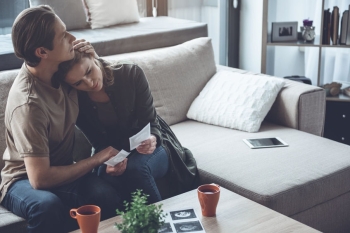
Believe it or not, there are many people out there who believe that grief is something that humans are meant to "resolve", and that good grieving is a process that has a beginning (the death), a middle (the grieving process), and an end (the myth of "closure"). I've encountered many well-meaning grief therapists who all too quickly assume that their patients are stuck in the grief process because they haven't managed to move on from mourning the individual who has died. As unbelievable as it may seem, much of my work as an academic involves bringing education to therapists to help them understand that grief is a process that we move through, and that moving on and moving forward does not mean leaving a deceased loved one behind.
As a grief therapist, one of my greatest goals is helping my patients understand the value of continuing bonds. This approach to grief helps us understand that, wherever we go, we may maintain our relationships with the people (and the babies!) that we have lost. As the term implies, the fundamental idea of continuing bonds is that relationships endure, and that meaning continues to be made as our lives, as survivors, go on, even in the wake of death. It is normal and healthy, in fact, to maintain a relationship with your loved one.
The most familiar illustration of continuing bonds can be found in the Mexican holiday, Dia de Los Muertos (Day of the Dead), in which loved ones create altars to pay homage to their deceased loved ones, creating art, performing music, cooking favorite dishes, and engaging in other activities as forms of remembrance. Stories are told about the deceased, and families spend time reminiscing about favorite moments. On this day, even children and babies who have died are remembered, and the spirits of the departed are believed to be very, very close to their loved ones.
Here in America, there is no specific day set aside to celebrate and honor the deceased: it can happen anytime, anywhere. Furthermore, continuing bonds can look different, depending on the griever and their relationship to the lost loved one. In the case of the loss of a parent, for example, surviving children may wish to continue to celebrate birthdays, honoring the deceased by cooking their favorite recipes, bringing up happy memories, or playing special meaningful songs.
How might you create some continuing bonds in the case of babyloss? You might be struggling to apply this concept in the case where perhaps you never got to meet your baby, and you may be wondering if it is even appropriate to continue bonds with your baby, at whatever stage of loss you experienced. The answer is, of course! The length of your pregnancy does not correlate with the length of your attachment with your baby, which cannot be quantified.
You may wish to start by asking yourself how you might feel most comfortable continuing bonds with your baby. If your loss is recent, these ideas may feel overwhelming, so be gentle with yourself and go at your own pace. It is important not to push yourself, so please consider these ideas if and when you are ready.
- If you are a writer, perhaps you might want to write some journal entries to your baby. These can be in poetry form, or you can write a letter. These entries can cover any topic, catching your baby up on your life lately, writing about your struggles with loss, or anything else. Try to extend yourself some grace as you write, allowing yourself as many minutes per day as you feel comfortable to set aside time to connect with your baby.
- Extend some love and warmth to your baby during intentional moments of slow, mindful breathing a few times during your day. Set a timer for five minutes, and observe your breath as you extend thoughts of love to your little one.
- Find a way to honor your baby's due date, or the date they passed away. You may wish to create a special compilation of music to play, light candles, have a special date night with your partner, or honor their memory by engaging in altruism or charitable giving.
- If you have ultrasound pictures, footprints, or other physical reminders of your baby, consider compiling them into a scrapbook that you can pull out when you are yearning for your baby. Similarly, some grieving moms find comfort hugging soft animals like birth weight bears that are filled with sand or rice to represent the weight of a baby that has died. They can be made from a variety of soft materials provided by families themselves.
- Go to therapy. Therapy is a safe space for you to remember your pregnancy, and your loss. This is your space and your time to connect with your baby in the presence of a supportive therapist.
Finding ways to continue bonds with your baby does not mean you are not "moving forward" with your grief. In fact, as you remember your baby and continue to connect, you might find that you are feeling more comforted and able to cope with other stressors surrounding both grief and your daily life.
There is no timeline to grief, and each individual's path is unique. Remember that the goal is not to resolve your feelings, but to integrate them into your life. I think you'll find that if you search for ways to maintain your connection with your baby, you'll come to find more and more ways of maintaining that bond, and you'll begin to find some meaning in this difficult experience.














